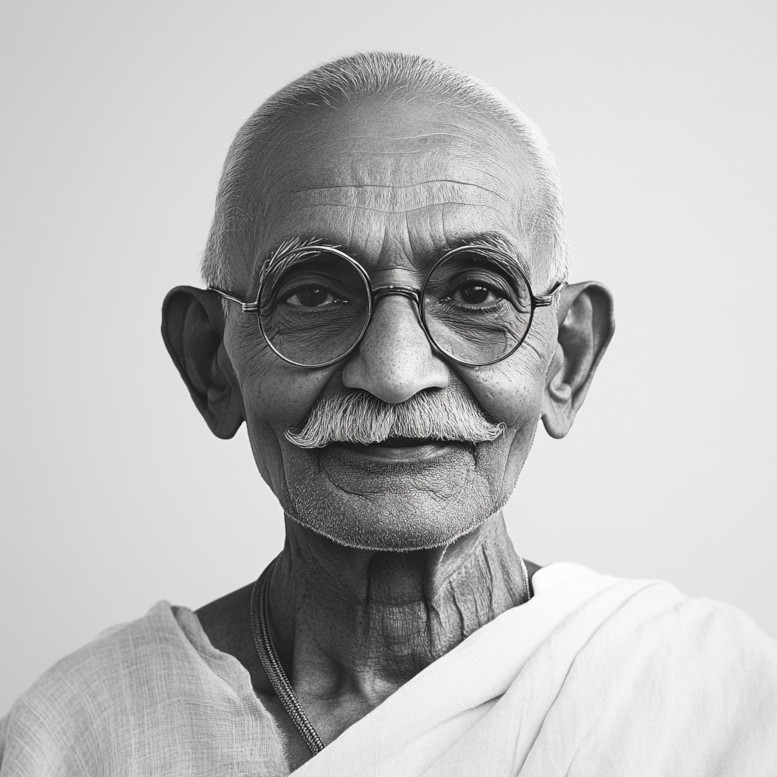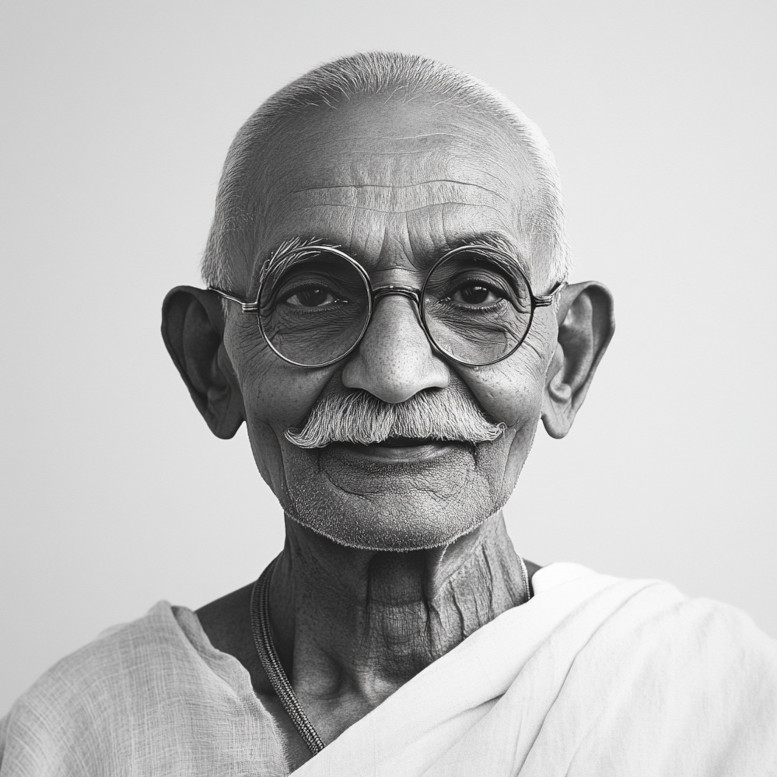


Mahatma Gandhi (1869–1948), born Mohandas Karamchand Gandhi, was an Indian lawyer, anti-colonial nationalist, and political ethicist who became the leader of the Indian independence movement against British rule. Employing nonviolent civil disobedience, Gandhi inspired movements for civil rights and freedom across the world. He is often referred to as "Bapu" (Father) in India and is officially honored as the Father of the Nation. His philosophy of nonviolence, known as Satyagraha, became a major influence on civil rights movements worldwide.
Experience in South Africa: In 1893, Gandhi accepted a one-year contract to work as a lawyer for an Indian firm in Natal, South Africa. His experiences in South Africa were transformative; he witnessed firsthand the discrimination faced by Indians under British colonial rule and was himself subjected to racial discrimination. These experiences motivated him to stay in South Africa for 21 years, during which he developed and practiced his philosophy of nonviolent resistance.
Satyagraha: It was in South Africa that Gandhi first employed the concept of Satyagraha—a term he coined meaning "truth force" or "soul force"—which advocated for nonviolent resistance as a means of social and political reform. He organized the Indian community in South Africa to protest against discriminatory laws, such as the Black Act and the registration law requiring all Indians to carry identification passes. His campaigns included boycotts, strikes, and mass civil disobedience, which gained international attention and eventually led to reforms in South Africa.
Return to India: Gandhi returned to India in 1915, where he was already well known for his work in South Africa. He was soon recruited by Gopal Krishna Gokhale, a leader of the Indian National Congress, to join the Indian struggle for independence. Gandhi traveled extensively across India, learning about the plight of the rural population and gaining a deep understanding of the socio-economic challenges faced by the country.
Champaran and Kheda Satyagraha: Gandhi's first major campaign in India was the Champaran Satyagraha in 1917, where he supported farmers in Bihar who were being forced to grow indigo under oppressive conditions by British planters. The success of this campaign was followed by the Kheda Satyagraha in Gujarat, where Gandhi led a successful tax revolt on behalf of farmers affected by crop failure.
Non-Cooperation Movement (1920-1922): In response to the Jallianwala Bagh massacre in 1919 and the oppressive Rowlatt Act, Gandhi launched the Non-Cooperation Movement in 1920. He called for Indians to boycott British goods, institutions, and honors, and to withdraw from government employment. The movement was largely peaceful and garnered widespread support, but it was called off by Gandhi after the Chauri Chaura incident in 1922, where protesters resorted to violence.
Salt March and Civil Disobedience Movement (1930-1934): One of Gandhi's most iconic acts of protest was the Salt March of 1930, also known as the Dandi March. In protest against the British monopoly on salt production and their salt tax, Gandhi led a 240-mile march from Sabarmati Ashram to the coastal village of Dandi, where he made salt from seawater. This act of civil disobedience galvanized the Indian independence movement and led to widespread defiance of British laws.
Quit India Movement (1942): During World War II, Gandhi launched the Quit India Movement in 1942, demanding an end to British rule in India. The movement called for mass civil disobedience and non-cooperation with the British government. Gandhi and other Congress leaders were arrested, leading to widespread protests and violence across the country. The British government suppressed the movement, but it intensified the demand for independence.
Role in Partition: As India neared independence, tensions between Hindus and Muslims escalated, leading to the demand for the creation of a separate Muslim state, Pakistan. Gandhi was a staunch advocate for Hindu-Muslim unity and opposed the partition of India. Despite his efforts, the Indian subcontinent was divided into two nations, India and Pakistan, upon independence in 1947, leading to widespread communal violence and mass migrations.
Nonviolence and Satyagraha: Gandhi's philosophy of nonviolence, or ahimsa, was central to his approach to social and political change. He believed that nonviolence was the most powerful weapon for oppressed people to achieve justice and that it required immense moral courage. His method of Satyagraha has influenced numerous civil rights and social justice movements worldwide, including the American civil rights movement led by Martin Luther King Jr. and the anti-apartheid struggle in South Africa led by Nelson Mandela.
Simple Living and Self-Reliance: Gandhi advocated for simple living and self-reliance as a means of resisting colonial oppression and promoting economic independence. He promoted the use of the charkha (spinning wheel) as a symbol of self-sufficiency and encouraged Indians to boycott British goods in favor of locally made products. He also emphasized the importance of rural development and the upliftment of India's villages.
Social Reform: Beyond his work for India's independence, Gandhi was deeply committed to social reform. He campaigned against the caste system, particularly the mistreatment of the Dalits (then known as "Untouchables"), whom he called Harijans (children of God). He also advocated for women's rights, religious tolerance, and the eradication of poverty.
Assassination: On January 30, 1948, Gandhi was assassinated in New Delhi by Nathuram Godse, a Hindu nationalist who opposed Gandhi's efforts to reconcile Hindus and Muslims. His death was a profound loss to India and the world, and he was mourned by millions.
Legacy: Mahatma Gandhi's legacy continues to resonate globally. He is revered as a symbol of peace, nonviolence, and social justice. In India, his birthday, October 2, is celebrated as Gandhi Jayanti, a national holiday, and is also observed as the International Day of Non-Violence. His life and teachings have inspired countless movements for civil rights and freedom across the world.
Influence on Global Leaders: Gandhi's philosophy influenced many prominent leaders and activists, including Martin Luther King Jr., Nelson Mandela, and Cesar Chavez. His ideas on nonviolent resistance and civil disobedience remain relevant in contemporary struggles for justice and equality.
Writings and Autobiography: Gandhi authored several books, letters, and essays, including his autobiography, The Story of My Experiments with Truth, which offers insights into his life, philosophy, and spiritual journey. His writings continue to be studied and revered by scholars and activists alike.
Mahatma Gandhi was a transformative figure in modern history, whose commitment to nonviolence, truth, and justice has left an indelible mark on the world. His leadership in the struggle for India's independence, coupled with his broader vision of a just and equitable society, continues to inspire people globally. Gandhi's life and legacy serve as a powerful reminder of the enduring strength of nonviolent resistance in the face of oppression and injustice.

We use cookies
We use cookies and other tracking technologies to improve your browsing experience on our website, to show you personalized content and targeted ads, to analyze our website traffic, and to understand where our visitors are coming from. Privacy Policy.